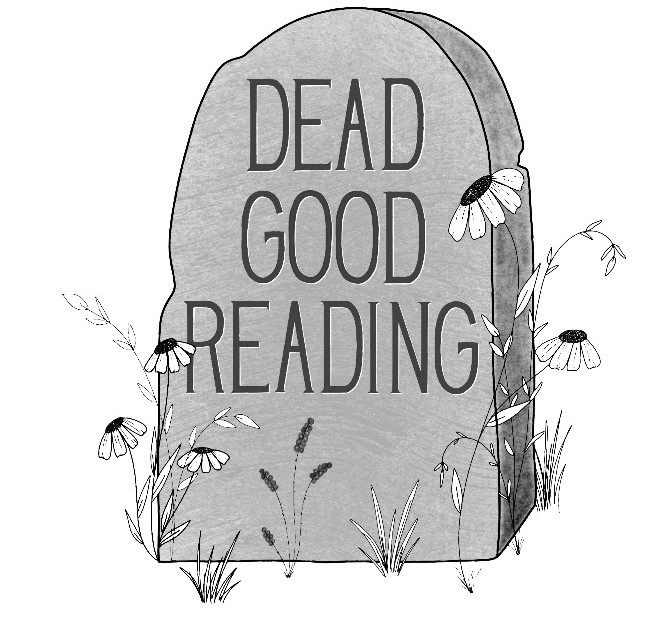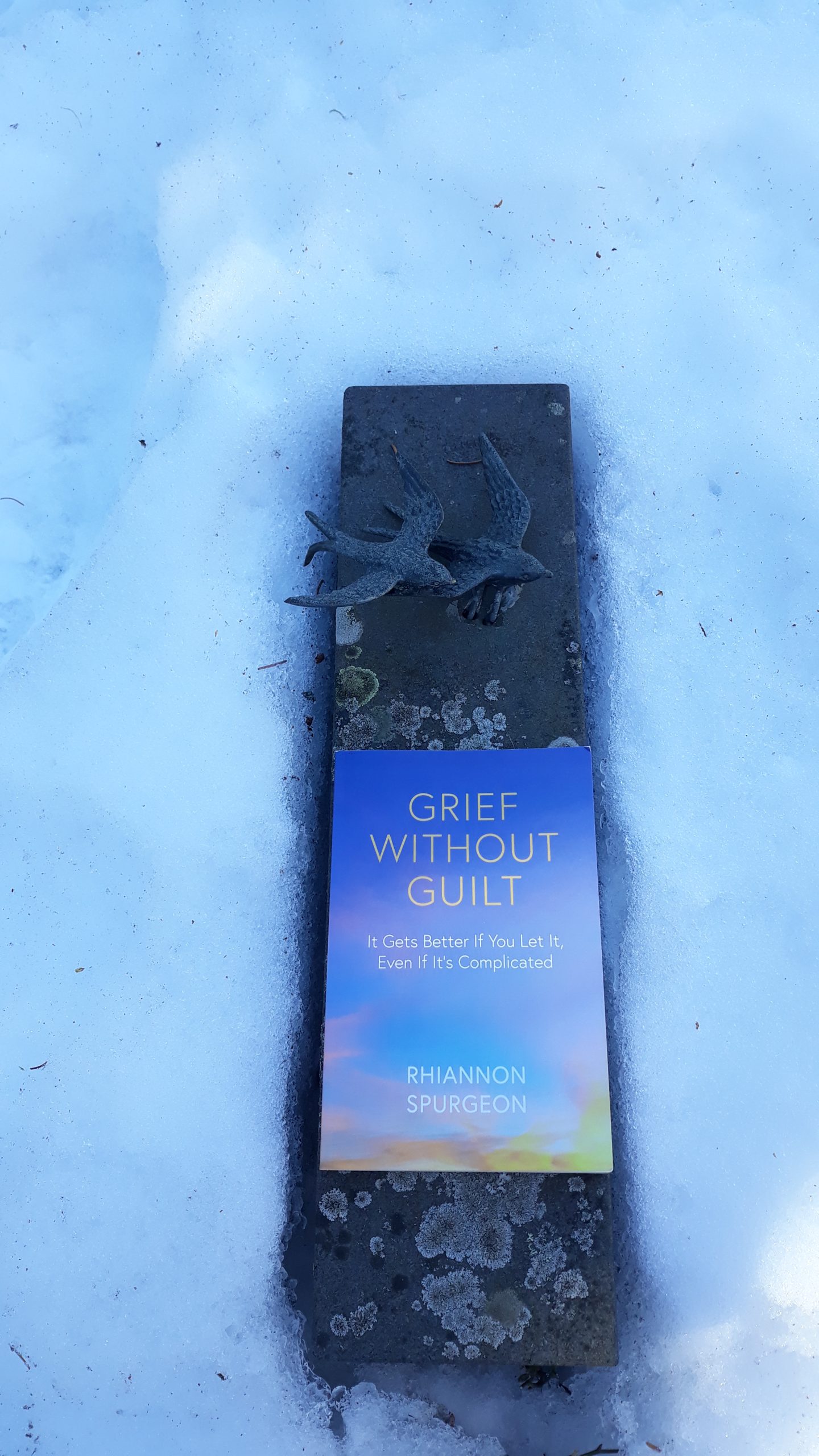Grief without Guilt: it gets better if you let it, even if it’s complicated by Rhiannon Spurgeon is the last book in this year’s Memoir March series; if you have any suggestions for next year’s Memoir March please write them down below!
So, I have read quite a few memoirs about grief, death and loss. A recurring sentence I have seen in these types of books over the years is a version of: ‘I couldn’t find the book for me, so I decided to write the book myself’. While I am sure this feeling that the right book is not out there is true for the authors of said books, I don’t think this is always the case, as there are A LOT of books about grief out there. I think the issue is, partly, that as authors Katrina Taee and Wendelien McNicoll point out in the Tsunami of Grief, that when you are actively grieving you don’t have the headspace to read, or to do a full-blown literature review on the available books out there on your particular flavour of loss. The book might also be ‘out there’ but written in a language different to your own. The authors may have used different key words or metaphors to describe their loss, so it doesn’t resonate with you, nor come up in your searches. So, when I saw this sentence appear in Spurgeon’s book, I felt a sense of scepticism. But then I read more about her particular set of circumstances, and quickly changed gears, thinking ‘ yes, you’re probably right’. And: ‘yes, that does sound complicated’.
While in this blog the words ‘complicated’ and ‘grief’ sometimes sit next to each other, at no point am I talking about what is called ‘complicated grief disorder’. I find it highly problematic that grief is pathologized in the psychiatric DSM manual. Grief is not an illness, but that is a story for a different time. For now, it is important to know I (and Spurgeon) are talking about the fact that the nature of the grief is complicated, not about whether or not grief is a mental health problem.
How do you grief and mourn for the father of your child, who you weren’t married to at the time and, importantly, who you were not on speaking terms with at the time of his death? Which category do you fall into? Are you allowed to grief? The grief and loss that Spurgeon describes in her book is indeed complicated:
“I was 34 when Oliver died. He was 38 and our baby girl, Tilly, was 10 days old.
He wasn’t my husband but I am still his widow.
Sometimes you need to clarify that for people who like everything in tidy boxes, neatly wrapped up. Life isn’t like that for me. I am not sure it’s that way for many people”
— Spurgeon, Page:35
Spurgeon became widowed and a mother roughly at the same time. This was thus a period with very complicated emotions.
In Grief Without Guilt Spurgeon shows that not just the death of Oliver was complicated, but that in fact there are many circumstances in her life that are not straightforward. By sharing her story, Spurgeon opens up the space for others to reflect on life simply not being easy. Death can complicate life, but life can surely already be really complicated without death interfering. Grief memoirs sometimes portray a particular loss as the key to all life’s problems, but Spurgeon highlights that for some people their entire live is quite complicated. And that is ok.
While Grief without guilt might not directly overlap with the complicated grief experiences of others, the overarching message is profound: we all live messy lives. We all have messy relationships that may or may not fall within a particular category. They may or may not be understood by others around us. They may or may not complicate our feelings of grief. I personally find it helpful to sometimes read about experiences that are vastly different to my own. Those stories equally help me to understand or situate my own situation.
I recently read the open access article Death of an Ex-Spouse: Lessons in Family Communication about Disenfranchised Grief written by Jillian Tullis. Tullis talks of a similarly complicated grief situation; she was informed by text that her ex-husband had died. Like Spurgeon, Tullis was trying to situate herself in relation to this loss: was she supposed to feel sad? Was she allowed to feel sad? Tullis uses the concept of disenfranchised grief as developed by Kenneth Doka to try and understand her loss. Doka defines disenfranchised grief as “the grief that is experienced when a loss cannot be openly acknowledged, socially sanctioned, or publicly mourned”. While Spurgeon and Tullis experiences are different, there are similar thoughts and feelings around the appropriateness of certain actions, rituals and forms of memorialization and whether they are allowed to be part of the inner circle that grieves. Tullis writes:
“It has been six months since I was notified, via text, of my ex-husband’s death. I talk freely about Tim when my life as a married person comes up and if people inquire about him today, I volunteer that he died. While I did visit his gravesite with my mom when I was home for Thanksgiving, I am still trying to come up with a ritual that would acknowledge and honor our relationship, as well as mark the end of Tim’s life. But this does not feel as urgent as it did six months ago”
— Tullis 2017 Page 5.
One of Spurgeon’s aims when writing this book was to help other people, to offer a safe space to those who’ve experienced similarly complicated losses. To make other people feel less alone in their complicated grief stories. I have shared the article written by Jillian Tullis for that purpose as well: there will be many hidden stories of complicated grief situations which people are reluctant or maybe even embarrassed to talk about.
Grief Without Guilt can be read as a memoir, but can also be used as a self-help book. Spurgeon ends each chapter with questions for the reader to help them reflect on their circumstances and feelings about their loss, at that point in time. These will be helpful for readers who, like Spurgeon, find placing their grief in a neat box difficult.
Grief without Guilt fleshes out that not every loss is straightforward, that it takes time to make sense of complicated feelings and that it will probably take the rest of your life to try to get your head around some of the issues you encounter. But like her subtitle alludes to: It gets better if you let it, even if it is complicated!
To learn more about Rhiannon Spurgeon visit her website.


Leave a Reply